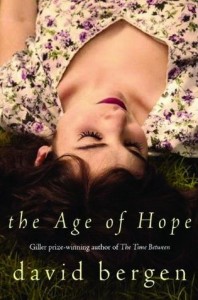 From the novel The Age of Hope, by David Bergen (2012, HarperCollins Canada):
From the novel The Age of Hope, by David Bergen (2012, HarperCollins Canada):
“I was born in 1930.”
“You were.”
“Oh, why write such nonsense?” And then, pleased, she said, “Leave out the unfortunate parts.” And then, “If you must tell the truth, be kind.”
“It’s not about you, Mom. You might recognize bits and pieces, but it is a novel.”
“I was not perfect. Never perfect. I was the furthest from perfect. But then that was not my intent.”
She was amazed that her middle daughter showed any interest in her. All of a sudden. And then she realized one day that the interest was ultimately selfish. Penny needed a story, was capable of making something out of nothing. She called her up one day and said, “It will be too episodic. You’ll need some backbone to the story. A plot. My life was plotless.” And she pictured her existence printed out on several hundred pages, formless and wilting in a drawer somewhere. “No one will want …” She struggled to conclude the sentence.
Another time she called Penny and said, “You might think twice about using my life. But if you go ahead, please leave out certain things I have told you. Paul’s kiss, the abortion, I don’t believe it would benefit anyone to know that, the bankruptcy, my work for Merry Maid, humiliating, the hotel room scene, whatever sex talk I have let slip, my weakness for sweets. You could wait till I’m dead. And failing that, try to lie a little. Also, at all costs, avoid sentimentality.”
Penny laughed. “Mom, this is fiction. If you want the facts, write a memoir.”